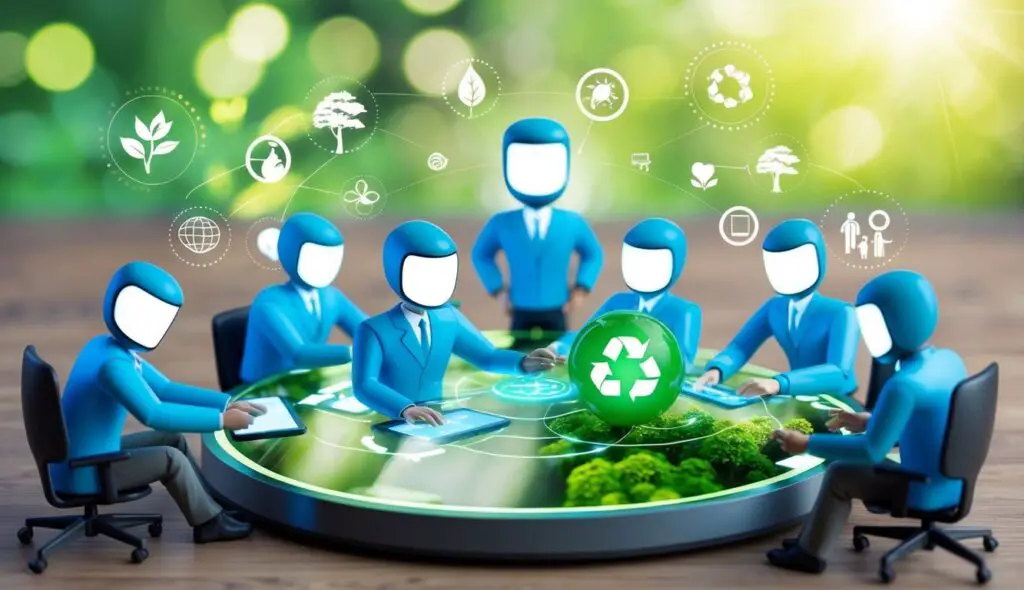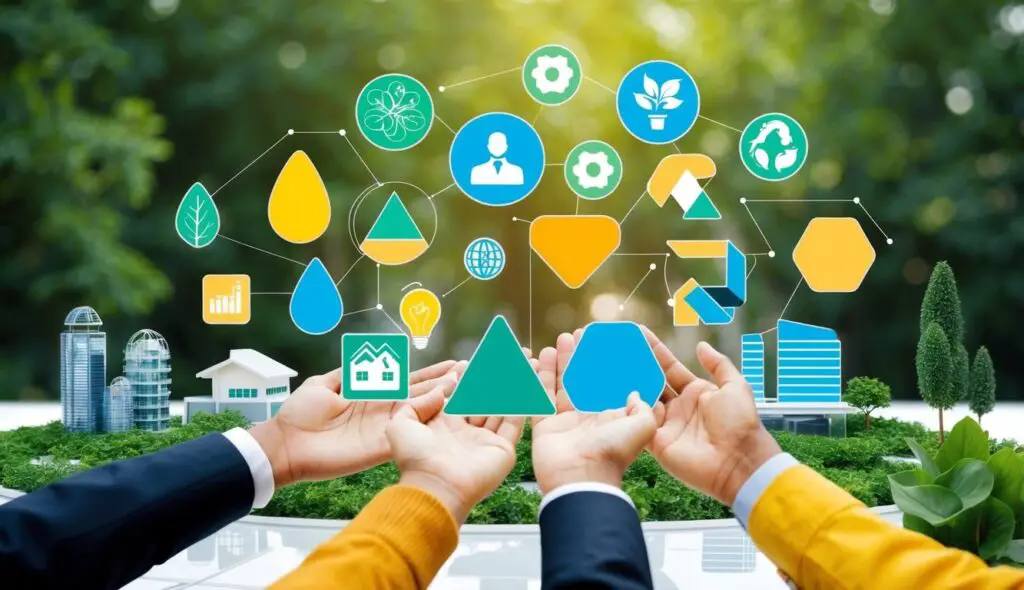Can team building be green and virtual at the same time? Yes, it can! As more companies embrace remote work, the need for eco-friendly team building activities in virtual settings has grown.
These practices help create strong bonds while reducing environmental impact.

Companies can boost team unity and protect the planet by using digital educational games about sustainability. Such games teach staff about green habits while fostering teamwork.
Other fun options include virtual moss wall art workshops, which bring nature indoors and clean the air.
Remote teams can also take part in eco-actions together. Ideas include group trash pickup days or tree planting events.
These activities get people working as a team for a good cause. They show that even far apart, staff can join forces to help the Earth.
Key Takeaways
- Virtual team building can be both fun and eco-friendly
- Digital games and nature-based crafts boost unity and green awareness
- Remote eco-actions let teams help the planet together

Remote teams can make a big impact on sustainability. Being eco-friendly helps the planet and brings teams closer together. It also shows that companies care about important issues.
Environmental Awareness and Team Cohesion
Sustainability plays a crucial role in shaping remote teams. When team members learn about environmental issues, they often feel more connected. This shared knowledge creates a sense of purpose.
Remote teams can take part in eco-friendly activities together. These might include:
- Virtual workshops on reducing waste
- Online challenges to lower energy use
- Group discussions about climate change
These activities help team members bond. They also teach important skills for a greener future.
Climate Change and Corporate Responsibility
Companies have a duty to address climate change. Remote teams can help in this effort. By working from home, employees already cut down on travel pollution.
Eco-friendly team building takes this further. It shows that a company cares about the environment. This can improve its image and attract eco-conscious clients.
Remote teams can set green goals. These might include using less paper or saving energy. Meeting these goals shows the company’s commitment to the planet.
Benefits of Eco-Friendly Practices on Productivity
Green practices can boost productivity in remote teams. When people feel good about their work, they often do better. Eco-friendly policies can create this positive feeling.
Some benefits of green practices include:
- Less stress from a cleaner work environment
- Better focus from improved air quality
- More energy from healthier habits
Sustainability initiatives in remote work can also save money. This allows companies to invest in better tools or training. These improvements can lead to higher productivity.
Strategies for Green Team Building

Green team building combines eco-friendly practices with team collaboration. It fosters environmental awareness while strengthening workplace relationships. Here are key strategies to implement sustainable team activities.
Incorporating Sustainability into Workshops and Seminars
Eco-friendly workshops focus on environmental topics and sustainable practices. Teams can learn about renewable energy, waste reduction, or local ecology.
Virtual seminars reduce travel-related emissions. They use digital materials instead of printed handouts.
Interactive sessions encourage brainstorming on workplace sustainability. Teams can develop green office policies or design eco-friendly products.
Guest speakers from environmental organizations add expertise. They inspire teams with real-world examples of sustainability in action.
Eco-Friendly Team Challenges and Activities
Green team initiatives build camaraderie through shared environmental goals.
Virtual scavenger hunts task teams to find eco-friendly items in their homes. This raises awareness of sustainable products.
Online gardening challenges encourage team members to grow plants. Participants share progress photos and tips.
Eco-trivia games test knowledge on environmental topics. They educate teams while fostering friendly competition.
Carbon footprint reduction contests motivate teams to lower their environmental impact. Members track and share their efforts over time.
Promoting Recycling and Resource Conservation
Teams create digital waste reduction plans. They set goals for minimizing paper use and energy consumption.
Virtual recycling workshops teach proper sorting techniques. Teams learn about local recycling guidelines and facilities.
Resource conservation challenges encourage reducing water and electricity use. Participants track their usage and share tips.
Teams design upcycling projects using household items. This promotes creative reuse of materials.
Online marketplaces facilitate sharing or donating unused items among team members. This reduces waste and promotes circular economy principles.
Leveraging Technology for Sustainable Practices

Technology plays a key role in making team building more eco-friendly. It helps cut carbon emissions, promotes environmental care, and connects teams with green suppliers.
Virtual Platforms and Reduced Carbon Footprint
Virtual platforms greatly lower carbon footprints for team building. They cut out travel, which means less fuel use and fewer emissions. Teams can meet online from anywhere, saving energy that would be used in office spaces.
These platforms offer many ways to connect. Video calls, chat rooms, and shared workspaces bring people together without harming the earth. Some tools even track carbon savings, showing teams the good they’re doing.
Virtual team building can be fun and green. Online games, quizzes, and workshops keep teams close while being kind to the planet.
Digital Tools for Environmental Stewardship
Digital tools help teams care for the environment. Apps track energy use and suggest ways to save. Cloud storage cuts paper waste. Smart scheduling reduces power use in offices.
Teams can use these tools to set green goals. They might aim to use less electricity or create less waste. Digital dashboards show progress, making it easy to see improvements.
Some tools teach about the environment. Online courses and games make learning fun. Teams grow closer as they learn to protect the earth together.
Collaboration with Eco-Conscious Suppliers
Working with green suppliers boosts team efforts to be eco-friendly. Online marketplaces help find suppliers who care about the planet. These suppliers use renewable resources and low-impact packaging.
Teams can use video calls to meet suppliers and learn about their green practices. This builds trust and shared values. Digital contracts cut paper use when working with these suppliers.
Supplier rating systems help teams choose the greenest options. These ratings look at things like energy use and waste reduction. By picking top-rated suppliers, teams support wider eco-friendly efforts.
Cultivating an Eco-Friendly Team Culture
Creating an eco-friendly team culture in virtual environments boosts employee morale, fosters creativity, and addresses environmental challenges. It brings teams together around shared sustainability goals.
Enhancing Employee Morale and Mental Health
Eco-friendly practices can significantly improve employee morale and mental health in virtual settings. Teams feel more connected to a larger purpose when working on green initiatives together.
Simple actions like encouraging the use of reusable water bottles or setting up virtual plant-growing contests can boost spirits. These activities give employees a sense of accomplishment beyond their daily tasks.
Mental health benefits from eco-friendly practices too. Virtual nature walks or meditation sessions focused on environmental themes can reduce stress. Teams can also set up online forums to share tips on sustainable living, creating a supportive community.
Fostering Creativity and Work-Life Balance
Eco-friendly team building activities spark creativity and promote better work-life balance. Virtual workshops on upcycling or creating art from recycled materials encourage innovative thinking.
Teams can organize online challenges like designing the most energy-efficient home office setup. This not only boosts creativity but also helps employees improve their work environments.
Work-life balance improves as team members adopt eco-friendly habits. For example, encouraging breaks to tend to home gardens or setting up virtual yoga sessions using natural surroundings as backdrops.
These activities help employees disconnect from work stress while staying connected to nature and sustainability goals.
Regular Meetings Focused on Environmental Challenges
Holding regular virtual meetings centered on environmental challenges keeps the team engaged with eco-friendly practices. These sessions can include discussions on current environmental issues and brainstorming sessions for workplace solutions.
Teams can set up a rotating schedule where different members present on various environmental topics. This educates the team and empowers employees to take leadership roles in sustainability efforts.
Green Team initiatives can be launched during these meetings. These groups focus on implementing specific eco-friendly projects within the virtual workplace.
Regular check-ins on the progress of ongoing green initiatives keep the team motivated and accountable. Celebrating small wins in these meetings reinforces the importance of eco-friendly practices.
Frequently Asked Questions
Virtual teams can engage in many eco-friendly activities. These build connections while promoting sustainability. Companies have options for special events and everyday practices that support the environment.
What are some engaging Earth Day activities that can be conducted virtually with work teams?
Teams can take part in a virtual sustainability challenge. This could involve tracking eco-friendly habits for a week.
Another option is to host an online workshop about reducing household waste. Teams could share tips and tricks they use at home.
How can businesses celebrate World Environment Day with their remote employees?
Companies can organize a virtual tree-planting event. Employees receive seedlings to plant at home and share photos.
A “green trivia” contest can test environmental knowledge in a fun way. Prizes could include eco-friendly products.
What interactive games can be integrated into virtual meetings to promote environmental awareness?
An online scavenger hunt for sustainable items in employees’ homes can be entertaining. This raises awareness about eco-friendly products.
“Guess the carbon footprint” lets teams estimate the emissions of various activities. It teaches about climate impact in an engaging way.
Can you suggest any environmentally themed virtual classroom games that are suitable for all ages?
A recycling sorting game works well for all ages. Players categorize items into the correct bins using a shared screen.
Creating “upcycled art” from household items encourages creativity and reuse. Participants can showcase their creations in a virtual gallery.
What innovative green initiatives can be implemented in a virtual office setting to encourage team building?
Teams can start a digital “green board” to share eco-friendly ideas and progress. This fosters collaboration and environmental awareness.
A virtual garden club allows employees to share plant care tips and progress photos. It connects team members through a shared green hobby.
In what ways can team spirit be fostered among remote teams through eco-friendly practices?
Monthly sustainability challenges unite teams around common goals. Challenges might include reducing energy use or choosing plant-based meals.
Group volunteering for environmental causes builds connections. Teams can participate in virtual clean-up events or online citizen science projects.

